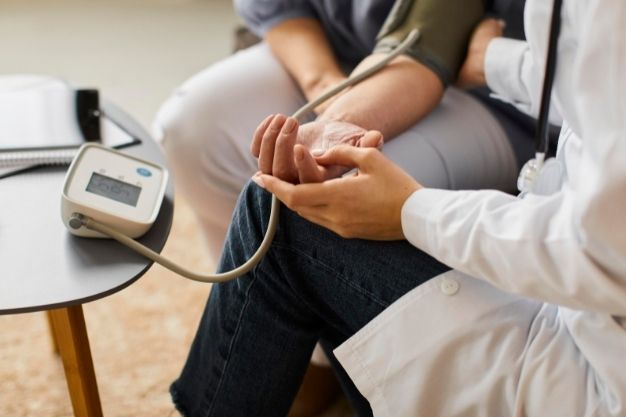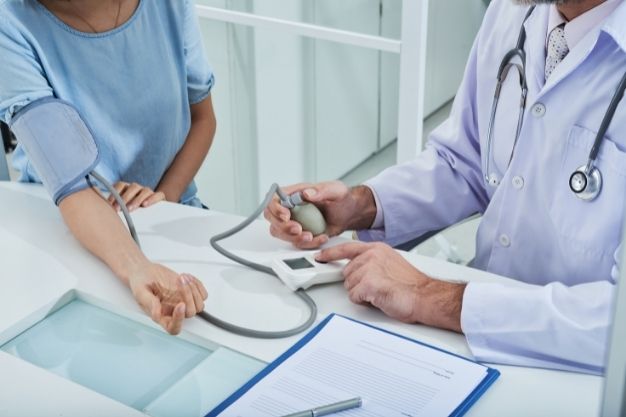How Homeopathy Treatment Works for Low Blood Pressure

- Written By ....Drcare Team
- Content reviewed by Dr AM Reddy
What happens when you don’t eat for 2 days or more?
You can already feel that dizziness, eh?
Well, what if I say, that dizziness be like a new normal for people suffering with Low B.P.
Horrifying to imagine, isn’t it?
But don’t be sad though!
Cuz down below we mentioned the best, side-effect free treatment available to treat Low B.P permanently.
Certain low blood pressure situations may not create much difficulties for some people. However, unusually low blood pressure (hypotension) can induce dizziness and fainting in people. In severe circumstances, low blood pressure can be fatal.
Low blood pressure is defined as less than 90 mm Hg of systolic pressure & 60 mm Hg of diastolic pressure.
Low blood pressure can be caused by dehydration to significant medical conditions. It is critical to determine what’s causing your low blood pressure to address it.

What exactly is blood pressure?
Blood pushes against the walls of the arteries and veins as it circulates through the body. Blood pressure is the force exerted by the blood as it presses against the walls of the blood vessels.
It is measured in systolic pressure (when the blood is pumping) and diastolic pressure (when the blood is not pumping i.e between beats, when your heart is at rest).
Throughout the day, blood pressure rises and falls. Normal blood pressure is less than 120/80 mm Hg. The top number in a blood pressure reading is the systolic pressure, and the bottom is the diastolic pressure.
What exactly is low blood pressure?
When blood pressure falls below the usual range, this is referred to as having low BP(hypotension). Doctors often define low blood pressure as 90/60 mm Hg or below, also known colloquially as “90 over 60”. Doctors often only treat hypotension when it is severe enough to create symptoms.
Low blood pressure can be an acute (short-term) disease or a chronic (long-term) problem. The following are the most common kinds of hypotension:
- Orthostatic hypotension: (also known as postural hypotension) It occurs when a person quickly stands up or changes posture and feels weak or lightheaded
- Postprandial hypotension: It occurs when a person’s blood pressure drops quickly after eating a meal, causing them to feel lightheaded or dizzy
- Neurally mediated hypotension: People with this disease feel faint, dizzy, and nauseous after lengthy periods of exercise or standing
- Shock-related severe hypotension: The most severe type of hypotension is a shock. When a person is in shock, their blood pressure drops to dangerously low levels, and their brain and organs are unable to function due to a lack of blood

What is the prevalence of low blood pressure?
Hypotension is frequent, and particular forms are more likely to develop in specific populations. Pregnant women and the elderly are prone to orthostatic hypotension. Postprandial hypotension is very prevalent in the elderly.
Low blood pressure affects who?
Low blood pressure can affect persons of all ages; however, it is more frequent in fragile or bedridden older adults. Orthostatic hypotension is more common in pregnant women and elderly persons. Neurally mediated hypotension is most common in children and young adults; however, it is typically outgrown.
People who are prone to hypotension include those:
- who’re you using any medicines that cause low blood pressure
- who’re suffering from hormone imbalances or a vitamin deficiency
- who have heart disease or liver disease
The Root Causes of Low Blood Pressure
Low blood pressure can arise as a result of:
- Long-term bed rest
- Pregnancy: It is usual for blood pressure to decline throughout the first 24 weeks of pregnancy
- Decrease in Blood volume: Reducing blood volume can induce a drop in blood pressure. Large blood loss due to substantial trauma, dehydration, or severe internal bleeding lowers blood volume, resulting in a significant reduction in blood pressure
- Certain medications: They can cause low blood pressure, including diuretics and other hypertension medications; heart medications such as beta-blockers; Parkinson’s disease medications; tricyclic antidepressants; erectile dysfunction medications, particularly when combined with nitroglycerine; narcotics and alcohol. When used with high blood pressure medicines, other prescription and over-the-counter(OTC) medications may produce low blood pressure
- Heart issues: An unusually low heart rate (bradycardia), difficulties with heart valves, a heart attack, and heart failure are all examples of cardiac disorders that can cause low blood pressure. Your heart may be unable of circulating enough blood to fulfill your body’s requirements
- Endocrine Issues: Complications with hormone-producing glands in the body’s endocrine systems, notably an underactive thyroid (hypothyroidism), parathyroid disease, adrenal insufficiency (Addison’s disease), low blood sugar, and, in rare circumstances, diabetes, are examples of endocrine disorders
- Septic shock (severe disease): Septic shock occurs when germs leave the original site of infection (usually the lungs, abdomen, or urinary system) and enter the bloodstream. The bacteria then release toxins that harm blood arteries, resulting in a significant and potentially fatal drop in blood pressure
- Anaphylactic shock (allergic response): Anaphylactic shock is a potentially deadly allergic reaction that can develop in extremely sensitive persons to medications such as penicillin, certain foods such as peanuts, or bee or wasp stings. Breathing difficulties, rashes, itching, a swollen throat, and a quick, dramatic drop in blood pressure define this form of shock
- Unlike orthostatic hypotension: This disease causes blood pressure to decrease after prolonged standing, resulting in symptoms such as dizziness, nausea, and fainting. This disease, which typically affects young individuals, is caused by a misunderstanding between the heart and the brain
- Deficits in nutrition: Anemia can be caused by a shortage of the important vitamins B-12 and folic acid, which can then lead to low blood pressure
Risk Factors of Low Blood Pressure
Low blood pressure (hypotension) may affect everyone; however, different varieties are more frequent based on your age or other factors:
- Age: Blood pressure drops after standing or eating are more common in persons over 65. Children and young adults are the most vulnerable to neurally caused hypotension
- Medications: People who use specific medicines, such as high blood pressure medications like alpha-blockers, are at a higher risk of developing low blood pressure
- Certain diseases: Parkinson’s disease, diabetes, and certain heart problems all increase your chances of getting low blood pressure
Complications of Low Blood Pressure
Even mild types of low blood pressure can result in dizziness, weakness, fainting, and an increased risk of damage from falls.
Furthermore, dangerously low blood pressure might deprive your body of enough oxygen to carry out its duties, resulting in heart and brain damage.
Other Suggestions for Low Blood Pressure
People who do not respond well to natural treatments may wish to consult their doctor about blood pressure medicines.
A person may also wish to think about:
- Avoiding lifting large items
- Not remaining in one area for an extended period
- Elevating the head of their bed
- Avoiding extended exposure to hot water
- Consuming extra fluids when exercising or on hot days
Treatment for Low Blood Pressure using Homeopathy
Many people can regulate their blood pressure by learning about the disease and its symptoms. Learn about your triggers and how to handle them if you have them.
If you have low blood pressure and are feeling low, your doctor may advise you to make lifestyle changes or seek medical treatment for low blood pressure. If you’ve been taking medication, take it exactly as advised to raise your blood pressure and avoid potentially dangerous problems.
It’s always a good idea to tell your doctor if you’re concerned about your blood pressure readings or any symptoms you’re experiencing.
 India
India UAE
UAE UK
UK United States
United States Dubai
Dubai






.png)